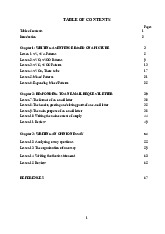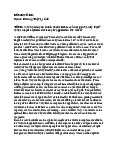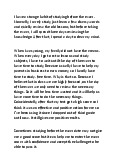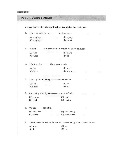







Preview text:
LESSON 1: ADJECTIVE CLAUSES 1
(WHO, THAT, WHICH- AS THE SUBJECT) I. LANGUAGE FOCUS
A relative pronoun can be the subject of its own clause.
Subject Relative Pronouns: who, which, that
American football, which is the most popular sport In the United States, began at Harvard University.
In this pattern, who, which, and that can be either singular or plural. Make the verb agree with the antecedent. I have not read the that magazine
is lying on the coffee table.
(The verb is lying is singular to agree with the singular antecedent magazine.)
I have not read the magazines that are lying on the coffee table.
{The verb are lying is plural to agree with the plural antecedent magazines.)
Adjective clauses are either restrictive (necessary) or nonrestrictive (unnecessary).
Restrictive (necessary): no commas
The professor who teaches my biology class won a Nobel Prize two years ago.
Nonrestrictive (unnecessary): commas
Professor Jones, who teaches my biology class, won a Nobel Prize two years ago.
The following examples show you how to combine two sentences to make a new sentence
containing a subject pattern adjective clauses. For People Restrictive
People save time and energy. They use microwave ovens. who, that
People who use microwave ovens save time and energy.
People that use microwave ovens save time and energy.
Nonrestrictive Microwave cooking is not popular with most professional chefs. Who
Professional chefs say that fast cooking does not allow flavors to blend.
Microwave cooking is not popular with most professional chefs, who
say that fast cooking does not allow flavors to blend. For Animals and Things Restrictive
Ovens are capable of cooking food quickly. They use microwave energy. That
Ovens that use microwave energy are capable of cooking foods
Nonrestrictive An electron tube in the oven produces microwaves. Microwaves cook Which
by agitating the water molecules in food.
An electron tube in the oven produces microwaves, which cook by
agitating the water molecules in food.
- You may delete the relative pronoun and the be verb when:
1.1. They are followed by a prepositional phrase.
Ex1: The man who is in the house is my father.
The man in the house is my father. 1
Ex2: The books that are on the desk are mine
The books on the desk are mine.
1.2. The main verb in the relative clause is progressive.
Ex1: The man who is swimming in the lake is my father.
The man swimming in the lake is my father.
Ex2: The books that are lying on the floor are mine.
The books lying on the floor are mine.
1.3. The main verb in tenses
Ex1: People who buy lottery tickets are often found at bingo.
People buying lottery tickets are often found at bingo.
Ex2: The bus which leaves at 6:03 was late today, so I caught the 6:08 one for downtown.
The bus leaving at 6:03 was late today. II. LANGUAGE PRACTICE
2.1. Combine the two sentences. Add commas if necessary.
1) She loves books (the books have happy endings). She loves books
that/which have happy endings: adjective clause= relative clause 2) They live in (
a city the city is in the north of England).
They live in a city that/which is in the north of England
3) The man is in the garden (the man is wearing a blue jumper). The man
who/that is wearing a blue jumper is in the garden.
4) Anyone must have a logical mind. He or she wants to be a computer programmer Anyone
who/ that wants to be a computer programmer must have a logical mind.
5) Foreigners also have difficulty with English spelling. English spelling is not always
consistent with its pronunciation. .
Foreigners also have difficulty with English spelling that/which is not always consistent with its pronunciation.
6) The fruit is on the table. The fruit isn’t fresh.
The fruit that/which is on the table isn’t fresh
7) While he lectured, he showed us a slide. The slide diagrammed the double helix structure of DNA.
While he lectured, he showed us a slide that/which diagrammed the double helix structure of DNA.
2.2. Reduce the relative clauses (Giản lược mệnh đề quan hệ) 2 1. The man is standing there is a clown. who
The man standing there is a clown.
2. Benzene, which was discovered by Faraday, became the starting point in the manufacture of
many dyes, perfumes and explosives
Benzene, discovered by Faraday, became the starting point in the manufacture of many dyes, perfumes and explosives.
3. My grandmother, who is old and sick, never goes out of the house.
My grandmother, old and sick, never goes out of the house.
4. Joggers who will run in the marathon should get to the stadium early to warm up.
Joggers running in the marathon should get to the stadium early to warm up.
5. A person who does at least 30 minutes of exercise a day will feel better.
A person doing at least 30 minutes of exercise a day will feel better.
2.3. Identify Adjective clause in the following sentences
1. Environmental science, which is compulsory for all students, is one of the most popular courses in the college.
…………………………………………………………………….. 2. The woman is a doctor who lives next door .
……………………………………………………………………..
3. The envelop which lies on the table has no stamp on it.
……………………………………………………………………..
4. The student don’t know how to do exercise which were given by the teacher yesterday.
……………………………………………………………………..
5. Words in English which begin with the consonants th are often difficult for foreigners to pronounce.
…………………………………………………………………….. III. PRACTICE IN TOEIC 3.1. Language building
a-Give some words which may be used to describe pictures 1-3. Compare with your friends
b-Complete the following about pictures 1-3 with the suitable words Picture 1 3
1. The man who is holding a suitcase is WEARING A SUIT/ SMILING/ABOUT 45 YEARS OLD…
2. The man who stands behind the
counter is WEARING A SUIT/ ABOUT 45 YEARS OLD/GIVING SOMETHING TO THE MAN Picture 2
3. The women sitting at the table are COWORKERS/ABOUT 40 YEARS OLD/DISCUSSING A PLAN
4. The women who are SITTING AT THE TABLE/ COWORKERS/ABOUT 40
YEARS OLD/DISCUSSING A PLAN try to reach an agreement. Picture 3
5. There are buildings on the side of the
river which IS IN the city/IS ALONG THE CITY.
6. People are walking along the path which IS CLOSE TO the river 3.2. Tactic Practice
3.2.1. Put the words in the correct order Picture 1 4
1. The/ searching/ guard/ is/ the/ apart/ his/ arms/ man/ who/ has.
The guard is searching the man who has his arms apart
2. The /raising/ man/ who/ arms/ is/ his/ is/ the guard/ searched/ by.
The man who is raising his arm is
3. Some/ listening to/ people/ a pen/ man/ searched by the guard are/ the/ holding/ who is.
Some people are listening to the man who is holding a pen
4. The/ the left/ a presentation/ man/ on/ is/ making.
The man on the left is making a presentation Picture 3
5. The/ reading/ man/ sits/ a / the shelf/ book/ next to.
The man reading a book sits next to the shelf
6. The/ book/behind /shelf/ reading/ man/ is/ the/ who/ is/ a
The man who is reading is behind the shelf
3.2.2. Make sentences about the pictures with the suggested words
1. who/ discuss/ engineers
The men who are discussing together are engineers 3. wait/ want/ line
The people who want to go into
the building have to wait in line 5
3. modern/ locate/ river
The buildings which are so modern are located next to the river
………………………………………….
………………………………………… IV. TEST PRACTICE
In this part of the test, you will write ONE sentence that is based on a picture. With each
picture, you will be given two words or phrases that you must use in your sentence. You can
change the forms of the words and you can use the words in any order. tie/ boat map/ look
1. The ship that is tied carefully is very big
2. The couple who is looking at the map is in the taxi 6
4 The man who is standing across the woman is wearing a tie hat/ look
3.The hats that are being sold/ displayed look similar st and/ across 7 woman/ hold
5.The woman who is holding a cup is about 30 years old teacher/ explain
6. The teacher who is explaining the lesson is wearing a shirt 8




